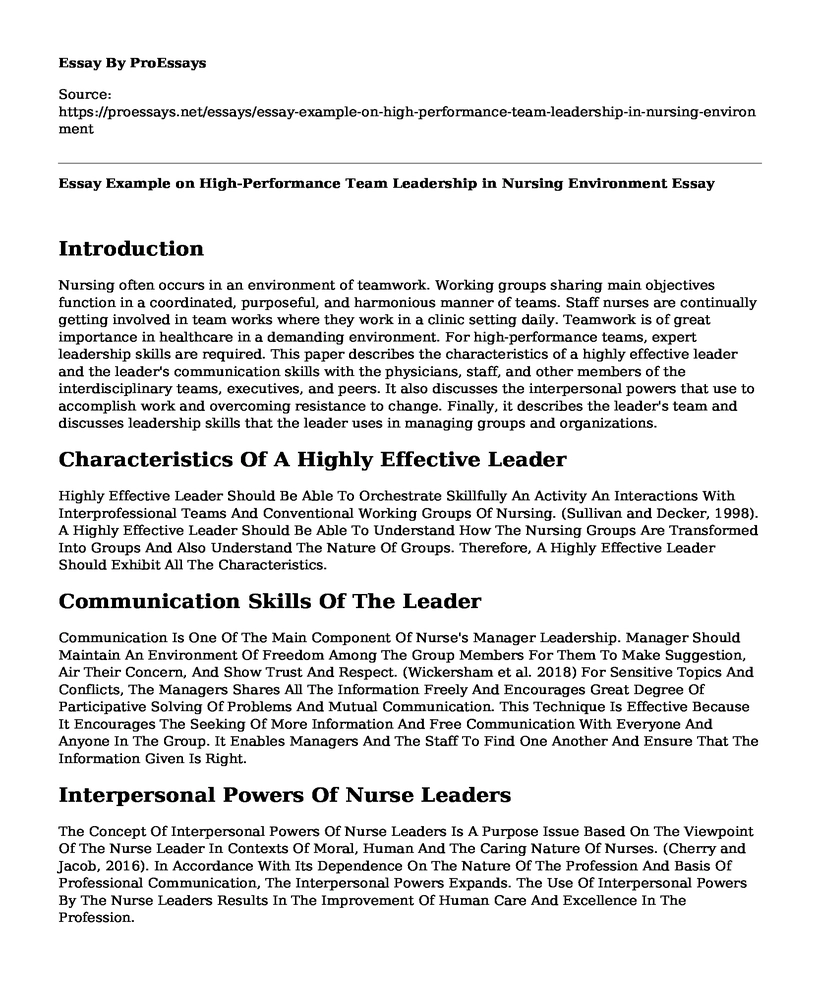Introduction
Nursing often occurs in an environment of teamwork. Working groups sharing main objectives function in a coordinated, purposeful, and harmonious manner of teams. Staff nurses are continually getting involved in team works where they work in a clinic setting daily. Teamwork is of great importance in healthcare in a demanding environment. For high-performance teams, expert leadership skills are required. This paper describes the characteristics of a highly effective leader and the leader's communication skills with the physicians, staff, and other members of the interdisciplinary teams, executives, and peers. It also discusses the interpersonal powers that use to accomplish work and overcoming resistance to change. Finally, it describes the leader's team and discusses leadership skills that the leader uses in managing groups and organizations.
Characteristics Of A Highly Effective Leader
Highly Effective Leader Should Be Able To Orchestrate Skillfully An Activity An Interactions With Interprofessional Teams And Conventional Working Groups Of Nursing. (Sullivan and Decker, 1998). A Highly Effective Leader Should Be Able To Understand How The Nursing Groups Are Transformed Into Groups And Also Understand The Nature Of Groups. Therefore, A Highly Effective Leader Should Exhibit All The Characteristics.
Communication Skills Of The Leader
Communication Is One Of The Main Component Of Nurse's Manager Leadership. Manager Should Maintain An Environment Of Freedom Among The Group Members For Them To Make Suggestion, Air Their Concern, And Show Trust And Respect. (Wickersham et al. 2018) For Sensitive Topics And Conflicts, The Managers Shares All The Information Freely And Encourages Great Degree Of Participative Solving Of Problems And Mutual Communication. This Technique Is Effective Because It Encourages The Seeking Of More Information And Free Communication With Everyone And Anyone In The Group. It Enables Managers And The Staff To Find One Another And Ensure That The Information Given Is Right.
Interpersonal Powers Of Nurse Leaders
The Concept Of Interpersonal Powers Of Nurse Leaders Is A Purpose Issue Based On The Viewpoint Of The Nurse Leader In Contexts Of Moral, Human And The Caring Nature Of Nurses. (Cherry and Jacob, 2016). In Accordance With Its Dependence On The Nature Of The Profession And Basis Of Professional Communication, The Interpersonal Powers Expands. The Use Of Interpersonal Powers By The Nurse Leaders Results In The Improvement Of Human Care And Excellence In The Profession.
Leader's Team
Leader's Team Consists Of People Who Mutually Interact And Influences One Another. They Exist In Both Formal And Informal Forms In Organizations. Formal Teams Are Temporary Or The Permanently Designated Individuals By An Organization To Be Able To Perform Specified Activities. The Leadership Team Is High Performing. (Tan and Kelly, 2017). This Is Because The Task Of The Leadership Team Are Well Elaborated And With Corporation From The Team Members And Hence Increased Efficiency In Work Performance.
Leadership Skills Necessary To Build And Manage Teams
To Build And Manage A Good Team, The Leader Should First Be Having Good Leadership Skills. First, The Leader Should Be Part Of The Team; This Enables Easy Management Of The Team. The Team Leader Should Be Able To Set Clear Goals And Expectations. (Cherry and Jacob, 2016). The Team Leader Also Should Be Able To Have A Good Feedback System Which Should Give Both The Positive And Negative Feedbacks And Finally, The Leader Should Be Able To Provide Mentorship And Motivates The Team Members.
Conclusion
In conclusion, building and managing a team is of great importance in nursing. The groups created are being led by team leaders. The nurse team leaders should have excellent leadership skills and characteristics for building and managing a team. Nurse team leaders should also have excellent communication skills for secure and efficient sending of information. Finally, the nurse's team leaders are empowered with interpersonal powers, which enable them to administer their tasks effectively.
References
Sullivan, E. J., & Decker, P. J. (1998). Effective leadership and management in nursing. AJN The American Journal of Nursing, 98(6), 16L.
Cherry, B., & Jacob, S. R. (2016). Contemporary nursing: Issues, trends, & management. Elsevier Health Sciences.
Tan, T. C., Zhou, H., & Kelly, M. (2017). Nurse-physician communication-A mixed review. Journal of Clinical Nursing, 26(23-24), 3974-3989.
Wickersham, A., Johnson, K., Kamath, A., & Kaboli, P. J. (2018). Novel use of communication technology to improve nurse-physician communication, teamwork, and care coordination during bedside rounds. Journal of Communication in Healthcare, 11(1), 56-61.
Cite this page
Essay Example on High-Performance Team Leadership in Nursing Environment. (2023, May 29). Retrieved from https://proessays.net/essays/essay-example-on-high-performance-team-leadership-in-nursing-environment
If you are the original author of this essay and no longer wish to have it published on the ProEssays website, please click below to request its removal:
- Decision Making in Business Venturing Essay
- Research Paper on Exposure Routes and Health Effects of Heavy Metals on Children
- Management Decision Problem for Increasing Share of the Athletic Shoe Market
- Paper Example on Bradley Furniture Inc: Threats Amidst Growth & Financial Losses
- Essay Example on Equal Partners: Decentralized Organizational Structure for Maximum Involvement
- Essay Example on Survival in a Changing World: The Power of an Effective Strategic Plan
- Report Sample on Antisocial Personality Disorder







